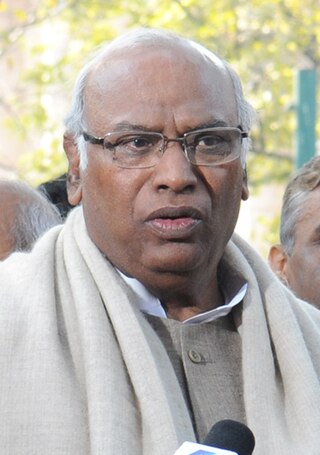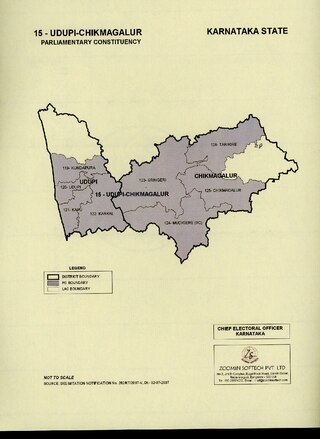Related Research Articles
Politics of India works within the framework of the country's Constitution. India is a parliamentary secular democratic republic in which the president of India is the head of state & first citizen of India and the Prime Minister of India is the head of government. It is based on the federal structure of government, although the word is not used in the Constitution itself. India follows the dual polity system, i.e. federal in nature, that consists of the central authority at the centre and states at the periphery. The Constitution defines the organizational powers and limitations of both central and state governments; it is well recognised, fluid and considered supreme, i.e. the laws of the nation must conform to it. India is officially declared a secular and socialist state as per the Constitution.

Haradanahalli Doddegowda Deve Gowda is an Indian politician who served as the 11th prime minister of India from 1 June 1996 to 21 April 1997. He was previously the 14th Chief Minister of Karnataka from 1994 to 1996. He presently is a Member of Parliament in the Rajya Sabha representing Karnataka. He is the national president of the Janata Dal (Secular) party. Born in a farming family, he joined the Indian National Congress party in 1953, and remained a member until 1962. He was imprisoned during the Emergency. He became President of the state unit of Janata Dal in 1994, and was considered to be a driving force in the party's victory in Karnataka. He served as the 8th Chief Minister of Karnataka from 1994 to 1996. In the 1996 general elections, no party won enough seats to form a government. When the United Front, a coalition of regional parties, formed the central government with the support of the Congress, Deve Gowda was unexpectedly chosen to head the government after V. P. Singh and Jyoti Basu declined the post and he was elected Prime Minister. During his tenure as prime minister, he also served as Home Minister for some time. His prime ministerial tenure lasted for less than a year. After his prime ministerial tenure, he was elected to the 12th (1998), 14th (2004), 15th, and 16th Lok Sabha, as Member of Parliament for the Hassan Lok Sabha constituency. He lost Lok Sabha elections in 2019 from Tumkuru but has been elected to Rajya Sabha since.

Shankarrao Bhavrao Chavan was an Indian politician who served as the chief minister of Maharashtra twice from 1975 until 1977 and from 13 March 1986 until 26 June 1988. He was the finance minister of India from 1988 to 1989 in Rajiv Gandhi ministry. He also served as the home minister of India twice, from 31 December 1984 to 12 March 1986 in the Rajiv Gandhi cabinet, and from 21 June 1991 to 16 May 1996 in the P. V. Narasimha Rao cabinet.

Somanahalli Mallaiah Krishna is an Indian politician who served as Minister of External Affairs of India from 2009 to October 2012. He was the 10th Chief Minister of Karnataka from 1999 to 2004 and the 19th Governor of Maharashtra from 2004 to 2008. SM Krishna had served as the Speaker of the Karnataka Vidhan Sabha from December 1989 to January 1993. He was also a member of Lok Sabha and Rajya Sabha at various times from 1971 to 2014. In 2023, Krishna was awarded the Padma Vibhushan, the second highest civilian award of India.

Shankersinh Vaghela is an Indian politician and former Chief Minister of Gujarat from. He was also the Leader of Opposition in 13th Gujarat Legislative Assembly.
Although India is a parliamentary democracy, the country's politics has become dynastic or with high level of nepotism, possibly due to the absence of party organizations, independent civil-society associations which mobilize support for a party, or centralized financing of elections. The dynastic phenomenon is present at the national, state, regional, and district level. The Nehru–Gandhi family has produced three Indian prime ministers, and family members have largely led the Congress party since 1978. The ruling Bharatiya Janata Party (BJP) also has several dynastic leaders. In addition to the major national parties, other national and regional parties such as Shiromani Akali Dal, Shiv Sena, Samajwadi Party, Rashtriya Janata Dal, Janata Dal Secular, Jharkhand Mukti Morcha, Dravida Munnetra Kazhagam, Kerala Congress, Jammu & Kashmir National Conference, Indian Union Muslim League, AIMIM, and the Nationalist Congress Party are all dominated by families, mostly those of the party founders.

The 8th Lok Sabha ran from 31 December 1984 to 27 November 1989. Politicians were elected in December 1984, taking office by the end of the month. The Lok Sabha is the lower house in the bicameral Parliament of India. 9 sitting members from Rajya Sabha were elected to 8th Lok Sabha after the Indian general election, in 1984.
Veerendra Basappa Patil was a senior Indian politician and was twice, the Chief Minister of Karnataka. He became Chief Minister for the first time from 1968–1971 and the second time was almost 18 years later, from 1989–1990.

Members of the 15th Lok Sabha were elected during the 2009 general election in India. It was dissolved on 18 May 2014 by President Pranab Mukherjee.

Mapanna Mallikarjun Kharge is an Indian lawyer and politician serving as the President of the Indian National Congress since 2022, and Leader of the Opposition in Rajya Sabha since 2021. He has been a Member of Parliament, Rajya Sabha from Karnataka since 2020.

Udupi Chikmagalur Lok Sabha constituency is one of the 28 Lok Sabha constituencies in Karnataka a state in southern India. This constituency was created as part of the implementation of the delimitation of the parliamentary constituencies in 2008, based on the recommendations of the Delimitation Commission of India constituted in 2002. It first held elections in 2009 and its first member of parliament was D. V. Sadananda Gowda of the Bharatiya Janata Party (BJP). Gowda was selected on 4 August 2011 to become Chief Minister (CM) of Karnataka after the previous CM B. S. Yeddyurappa resigned. He therefore had to resign as MP for this seat which forced a by-election in 2012. This by-election was won by K. Jayaprakash Hegde of the Indian National Congress (INC). As of the latest elections in 2019, Shobha Karandlaje of the BJP represents this constituency.
Chikkamagaluru Lok Sabha Constituency was a former Lok Sabha (parliamentary) constituency in Karnataka state in southern India. With the implementation of the delimitation of parliamentary constituencies in 2008, it ceased to exist.
Korgi Jayaprakash Hegde is an Indian politician who has been a Minister in the Government of Karnataka. He is the Chairman of the Karnataka Backward Class Commission. As Minister in charge of undivided Mangalore and Chikmagalur, in 1997, he is the reason for the creation of Udupi district, from undivided Mangalore and Udupi. He was also a Member of India's Parliament representing Udupi Chikmagalur.
Daradahalli Byregowda Chandregowda was an Indian politician who was Speaker of Karnataka Legislative Assembly, three-term MLA, one-term MLC, and Member of Parliament—three-terms from Lok Sabha and one-term from Rajya Sabha.

Chandresh Kumari Katoch is an Indian politician belonging to the Indian National Congress party. She is a former Minister of Culture in India's central government. She was a Member of Parliament in the Lok Sabha, representing Jodhpur constituency.
Elections in the Republic of India in 2018 included by-elections to the Lok Sabha, elections to the Rajya Sabha, elections to of eight states and numerous other by-elections to state legislative assemblies, councils and local bodies.
Chandraprabha Urs was a politician from Karnataka. She was a member of the 10th Lok Sabha and Karnataka Legislative Assembly. She was with Janata Party and Congress at various times.
M. Basavaraju was an Indian politician of the Indian National Congress. He was also member of Karnataka Legislative Assembly and member of Rajya Sabha.
Nayana Motamma, nee Jhawar, (1980) is an Indian politician from Karnataka. She is a member of the Indian National Congress. She became a member of the Legislative Assembly of Karnataka from Mudigere Assembly constituency which is reserved for SC community in Chikmagalur district in the 2023 Karnataka Legislative Assembly election.
Chikmagalur Mudigere was one of the Karnataka Legislative Assemblies or Vidhan Sabha constituencies in Mysore state. It was part of Hassan Chickmagalur Lok Sabha seat.
References
- 1 2 3 4 5 "Members Bioprofile: Siddhartha, Smt. D.K. Thara Devi". Lok Sabha . Retrieved 25 November 2017.
- ↑ Vohra, Pankaj (1 March 2014). "Rahul may fight from two seats". The Sunday Guardian . Archived from the original on 1 December 2017. Retrieved 25 November 2017.
- 1 2 3 Ramaseshan, Radhika (12 November 2002). "Sangh blood too thick for Cong converts". The Telegraph . Archived from the original on 14 November 2002. Retrieved 25 November 2017.
- ↑ "Taradevi to quit BJP". Deccan Herald . 24 March 2004. Retrieved 25 November 2017.